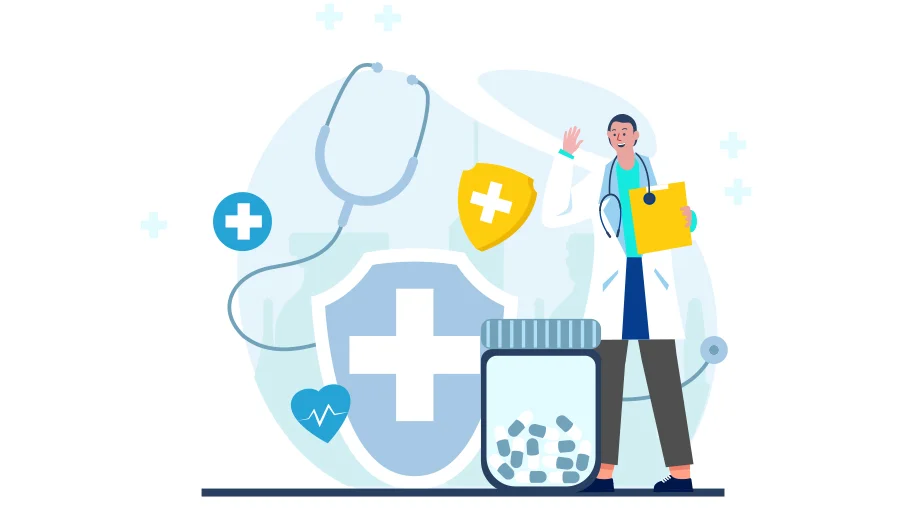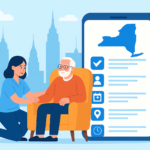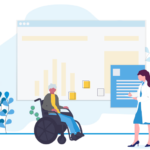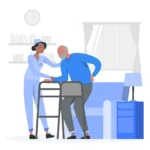As the home care industry continues to grow, so does the need for efficient and accurate Electronic Visit Verification (EVV) systems. The EVV system has become a crucial tool for home care providers, enabling them to monitor and verify the services provided to Medicaid beneficiaries accurately.
There is increasing pressure to prevent fraud and states are moving forward toward verifiable proof for Medicare reimbursements. The 21st Century Cures Act encourages state agencies to implement an electronic visit verification system (EVV System) for personal care services and home health care services under Medicaid.
The term ‘Electronic Visit Verification’ concerning personal care services or home health care services, is a system under which visits conducted as part of such services are electronically verified concerning
- The type of service performed
- The member receiving the service
- The date of the service
- The location of service delivery
- The care provider responsible for the service
- The time the service begins and ends
In recent years, the implementation of EVV has become a requirement for Medicaid reimbursement, making it essential for home care providers to find an efficient and reliable EVV system. With the advancements in technology, providers can now leverage GPS EVV apps and other digital tools to streamline their operations and improve accuracy in their care provider timesheets.
While an electronic visit verification system helps state agencies verify visits and prevent fraudulent claims, the EVV system also presents a unique opportunity for care providers to boost their bottom line. Picking the right solution is the key!
A modern mobile workforce solution like allGeo helps you do more than just verify visits – it can help you cut down on payroll and mileage costs, boost productivity, automate business processes and operation workflow, monitor the safety and security of caregivers, and much more.
Here, we’ll discuss the key features to look for when selecting an EVV system to ensure your business remains compliant with Medicaid EVV requirements while maximizing efficiency and improving patient care.
App-based Workforce Solution for Home Care Businesses
The increasing adoption of mobile phones makes mobile technology-based EVV solutions an ideal choice for your business. EVV system-based mobile technology uses the underlying capabilities of mobile devices (phones and tablets) like sensors, mobile apps, text messages, cloud technology, etc. Such systems are future-proof as they get better as technology evolves.
The modern EVV solution for all types of caregivers uses the app on mobile devices, specifically smartphones, and tablets. Most modern mobile devices have GPS chips for location-based services.
Electronic visit verification via GPS tracking and geofencing provide you with a holistic solution to manage your mobile caregiver teams.
Geofence and GPS-based Visit Verification
Geofences, also known as geo zones, are virtual perimeters around a predefined area on the map. For health care and home care services, geofences can represent the client’s place (care recipient’s address) and/or business offices.
By setting up geofences for all your clients’ addresses, a modern EVV system like allGeo can automatically record the visits made, the time of the visit and the duration, and the service performed.
Geofence-based EVV works automatically! It requires no interaction from the end-user – the caregiver – so no training or learning curve hassles. The system automatically detects the caregiver’s presence at the client’s address and records visits. It provides an error-proof visit audit log, leaving no room for any “fraudulent practices” such as clients dialing in (IVR-based EVV) for their caregiver.
Geofence-based EVV allows you to do more than just verify visits! The technology helps you automate day-to-day operations, such as routing, attendance (number of visits, time, duration), monitoring exceptions (missed visits, delay), and more. Below are some of the use-case possibilities.
Driving Directions and Routing
Geofenced client addresses and routing features in EVV apps have significantly improved productivity and efficiency for caregivers. With geofencing, the caregiver can access their daily schedule and quickly retrieve the addresses of their clients. The app then provides driving directions and routing information, eliminating the need for caregivers to spend time planning their route or getting lost while on the road.
This feature not only saves time but also boosts productivity by allowing caregivers to plan their schedules and allocate their time more effectively. As a result, caregivers can see more clients per day, which can increase revenue and reduce payroll costs.
Moreover, the routing feature also helps reduce travel time and expenses, as the app suggests the most efficient route to the client’s location. This can help caregivers save money on gas and vehicle maintenance costs, while also reducing carbon emissions and promoting environmental sustainability.
Automatic Mileage Tracking and Reporting
The EVV app tracks the total miles driven by each caregiver along with the site breakdown for billing.
Traditionally, mileage tracking was done manually, which was time-consuming and prone to errors. However, with the advent of technology, mileage tracking and reporting have been automated, saving time, reducing errors, and increasing accuracy.
The system eliminates the need for manual record-keeping, reducing the risk of errors and fraudulent claims. It also saves time and increases productivity, as the user does not have to spend time manually recording mileage or preparing reports.
Caregiver Safety Monitoring and Alert Escalation
Caregiver safety is a top priority for home care providers, and geofences have been instrumental in ensuring their safety. With geofencing, the system can detect when a caregiver has arrived at a client’s location and can monitor their movements while on the job. However, safety monitoring does not stop there.
To further enhance caregiver safety, EVV systems can be set up with custom workflows that can monitor and detect any potential threats. These workflows can be programmed to send alerts to the appropriate parties, such as supervisors or emergency services, in case of any suspicious activity or emergencies.
For example, if it’s more than 10 minutes into their visit, the system can be set up to send out a text requesting the caregiver to confirm their safety (for example: Are you Ok?).
Based on the response (or no response) the system can automatically escalate the issue as per the defined workflow – like a phone call to the caregiver, if no response, alert the manager, and even 911 based on the location. Thus, geofencing and custom workflows help home care providers monitor safety threats in real time, reducing risks and promoting a safer work environment.
Job-dispatch/Operations Automation Workflow
With real-time caregiver location and client addresses, an EVV system can automate job dispatch and operations workflow based on real-world events. For instance, if a caregiver is running late, the system can automatically notify the client and reschedule the visit, without requiring any manual intervention.
Moreover, the system can also provide alerts and notifications to caregivers, supervisors, and clients, regarding any changes or updates in the schedule, such as new assignments, cancellations, or rescheduling. This can help improve communication and collaboration among all parties involved, reducing confusion and misunderstandings.
Furthermore, the automation workflow can also track the time and duration of each visit, and automatically generate timesheets and billing reports, eliminating the need for manual data entry and reducing the risk of errors. This can save time and reduce payroll costs, while also ensuring accurate and timely billing and reimbursement.
Conclusion:
To sum things up, holistic electronic visit verification (EVV) systems offer numerous benefits to home care businesses, including improved caregiver safety, streamlined operations, and accurate billing and reimbursement.
When choosing an EVV app, it’s essential to look for features such as GPS tracking, geofencing, automatic mileage tracking and reporting, job dispatch and operations automation workflow, and caregiver safety monitoring and alert escalation.
By leveraging these features, home care providers can enhance their services, improve communication and collaboration among all parties involved, and promote a safer and more efficient work environment. Ultimately, selecting the right EVV app can help home care businesses stay competitive and provide high-quality care to their clients.
Try allGeo’s Automatic Electronic Visit Verification System. If you’re looking for an EVV solution for your agency, talk to our EVV expert today!



